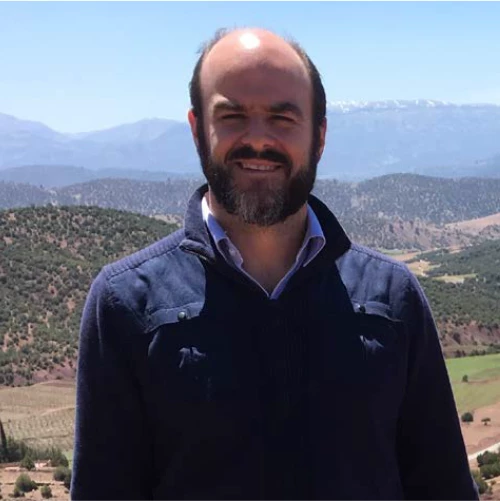 The Digital Water community of utility practitioners from Latin America and Africa visiting Idrica headquarters in Valencia, Spain. © Sarah Daggett/World Bank.
The Digital Water community of utility practitioners from Latin America and Africa visiting Idrica headquarters in Valencia, Spain. © Sarah Daggett/World Bank.
Utilities around the world are looking to innovate digital solutions. To respond to this, the World Bank Water Global Practice has created a new knowledge and technical assistance platform called “Digital Water,” to transform water and supply and sanitation utilities into smart-enabled organizations. Digital Water offers digital maturity assessments, trainings, and knowledge products to support specific project components and help operators modernize and improve their performance.
We launched the first digital training course of its kind in partnership with IDRICA, a technology company born out of the transformation of a water utility in the Spanish city of Valencia. The core of this training lies in collaboration between World Bank water specialists and utility practitioners, unique peer-to-peer discussions, and a curriculum tailored to utilities’ readiness levels and needs. The first training, which took place in Spain in May, followed activities that began weeks earlier to help utilities identify their priorities and make them aware of the digital opportunities.
The course supported clients from Peru, El Salvador, Argentina, the Dominican Republic, Burundi, Guinea, Zambia, and the Democratic Republic of Congo, with the aim of helping them integrate technology into day-to-day operations. Participants from eight utilities and one technical regulator attended, plus water and supply and sanitation specialists from Africa and Latin America.
Key Takeaways
- Digital is a necessity, and we need to start now: The digitalization of the water cycle is already underway in many parts of the world, including the use of AI, but many utilities need help to structure their transition to a proactive, data-driven approach. Sustained support is necessary to help utilities begin or continue their digital transformation.
- There is an entry point for everyone! Peer-to-peer networking is key. The training brought diverse personnel, such as CEOs, IT personnel, and others, with each participant finding entry points relative to their work. Despite the varying levels of digital development at their utilities, most personnel shared similar operational challenges, ideas and experiences during debates and roundtable discussions.
- Nonrevenue water reduction is a priority, and digital solutions are here to play a catalytic role. Four out of the eight utilities (two in each region) selected nonrevenue water as the main challenge that they wished to address with digital means. Special emphasis was made on (1) real-time monitoring and leak detection; (2) predictive maintenance and asset management; and (3) breaking down organizational silos by enabling more effective data sharing and integration capabilities.
Such changes will positively impact thousands of citizens across Africa and Latin America, further advancing our SDG6 development goal.
Next Steps
Participants left with a better understanding of how to accelerate their company's digital transformation by learning about examples of quick wins and the long-term benefits. The Digital Water team encouraged clients to organize workshops with their leadership teams to share what they had learned and plan the next steps, such as creating a digital roadmap and surveying employees' digital skills.
Interestingly, peer-to-peer learning has also encouraged them to continue learning solutions from each other and forged cross-Atlantic friendships. Our team intends to continue supporting change throughout each utility’s transformation, by leveraging top-notch technology, and creating virtual spaces to discuss insights and ideas.
The next Digital Water Training Week will take place in South Korea at the end of 2024 in partnership with K-Water and will target utilities in South Asia and East Asia the Pacific.
The Digital Water Team is building a Community of Practice for utility-level practitioners to promote the sharing of experience, learning, and peer cooperation. Please join our community here. If this approach interests you, please get in touch with us, and you can learn more about us. You can email the Digital Water group at digitalwater@worldbank.org.


Join the Conversation